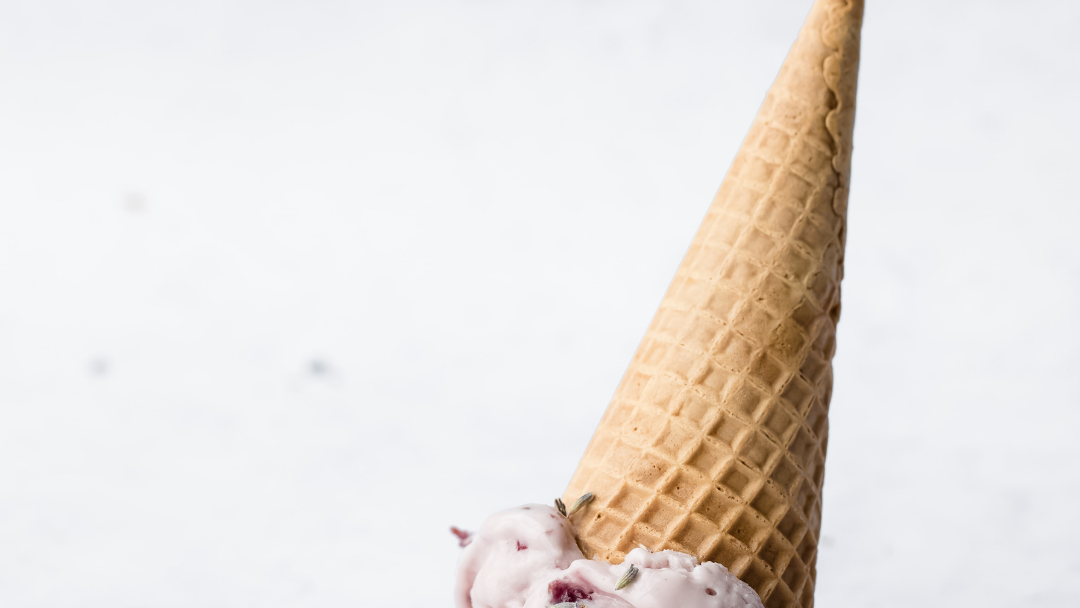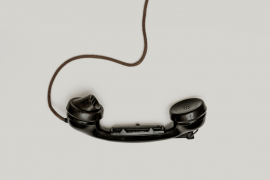MY MOM USE TO WALK TO THE DAIRY QUEEN. She’d do that two or three times a week. It was about a mile away. A little more. She would always say, “The walk will take care of the calories.” All that soft serve. Reese’s Pieces and M&M’s. She’d say, “Four-thousand steps, that’s twice as many as the Empire State Building. And I’d know. I’ve been there.” She’d tell that to us every time. Like it was new information. Like we forgot from when she told us that exact same thing two days before, a day before that, and two or three days before that. Like we forgot all about those four-thousand steps, that she’d been there. Like we hadn’t heard it four-thousand times.
“The walk will take care of the calories.”
Not that she needed to worry. She was a skinny, little thing. Small as a mouse. Cute. Or so my dad would always say.”‘She’s so cute the whole county wanted her for themselves. But I’d have none of it. She was mine,” he’d say. “She was mine,” he’d always repeat. The first delivery would be full of pride, fierce. The encore, wistful, even sad. I could hear it now. “She was mine,” the confident, brash older brother. “She was mine,” the shy and unsure little kid.
My mom used to walk to the Dairy Queen. She’d do it all the time. We’d as often as not let her go alone. It was her walk. Her ritual. Let her enjoy those 1000 calories, the 4000 steps that earned her them.
There was nothing but soybean fields for miles. We could watch her from the porch, see my mom walk almost all of the way until at the very end when the road dipped down a swell to join with the state junction. At night, beyond that little swell, you could make out the glow of the big D.Q. sign, white and red. You couldn’t see the sign. Not behind that small dip in the road. But you could see the light.
Sometimes Mom made the trip to get her Hydrox Blizzard, or Nerds, or Butterfinger. Sometimes it was just a Buster Bar or a soda float. Whatever she was having, sometimes she made the trip at night. You couldn’t watch her unless the moon was out and more than half full. But you could look at that light a little over a mile away and know that was where she was going. Momma liked those night walks best.
She died. My mom. She died in the Dairy Queen parking lot. She died in the queue. At the drive-through. Even though she didn’t drive a car she liked the idea. Using the intercom. Walking up to the window. She got a kick out of it. And the staff knew her for it. So she did it every time.
It was a drunk driver. He pulled in off the state junction and peeled into the parking lot. He hardly slowed, as people tell it, as he zoomed his pickup truck into the queue and barreled over my mom. I don’t know what kind of Blizzard she got that night. But I remember the melted ice cream on the pavement, pink with blood and reflecting the red and blue of the police lights.
The driver just sat there. He must have known his fate. He must have known he was done for. Drunk as he was. A dead woman under his wheel. He must have known it was hopeless. Hopeless for him and hopeless for my mother too. Still, I always found that off-putting. I mean, beyond the much more relevant and horrible fact that my mom had died, that this drunk man had killed her … the less important fact, but irksome notion, that the guy just sat on his ass as my mom bled out. I mean, get out of the car. Scream to call for an ambulance. Go through the fucking motions.
I guess the guy was too much in shock. Maybe he was a war vet and the sight of blood brought him back to horrors that even dead women in a Dairy Queen parking lot could not compare to. Who knows. But the guy, for killing my mom, but almost more so for his inaction after the fact … the guy was someone I had nothing but contempt for. Utter revulsion.
In his defense he said he knew it was stupid. He said he knew it was a bad idea, getting into the car after all of those drinks. But he wanted one of those Starkiss treats. A lime one, he said. He actually said that. That was his justification for killing my mother. That he wanted a lime flavoured, star-shaped frozen ice cream. My dad nearly killed him before the cops ushered him to jail. I think that was my dad’s version of defense. Getting angry. Better that than the tears, the overwhelming grief.
And he did become one angry mean bastard of a man after Mommadied. If you said the wrong word, gave the wrong glance, he’d wither you with this hateful look. Like it was you who killed his wife. If he caught you with an ice cream you’d get a bruise on the arm or cheek. If he found a Dairy Queen receipt in your pocket he’d beat you bloody. One time he caught my sister, Maggie, walking out of the Dairy Queen front door with a Dillybar in her hand. He marched up to her and swatted the thing onto the hot pavement. He cursed at her in front of everyone. Even Miss Evans, the schoolteacher. The cuss words that came out of his mouth … it was too much for the small town crowd that had gathered.
Later, he told us he’d not hit Maggie. “I don’t hit women,” he declared, like he was a saint. “And don’t I ever catch you doing it, either,” he pointed to me with a stern finger and rage in his eyes. Like I had done something bad. Like I had done anything. Anything other than breathe or perhaps blink as I sat at the dinner table. “I don’t hit women,” he said it again. But he did hit men. So I got Maggie’s beating. I got the black eye and the torn ear for her attempt to enjoy that fucking Dillybar. And after that the dog got a heavy boot in the ribs for good measure. The poor beast was sleeping. It had been so confused. I don’t think a living creature on this Earth has had a ruder awakening.
But my dad wasn’t all bad. After a few months, half a year or maybe a little more, his bouts of rage subsided. Overtime they went away entirely. We were grateful, me, Maggie, the dog. But the morose man that replaced the raging devil wasn’t a picnic either. He’d cry and apologize. He’d cry about Mom, too. I mean, that was the root of it. The source. But whenever he sobbed out back behind the shed or softly into the cushions of his La-Z-Boy by the fire he’d vocalize his sorrow by announcing his shame. For hitting us. For hurting us. For being the dad that he swore he’d never be. The dad like the one he himself had had.
I knew my dad was seriously sorry, gravely sincere, when he came home with an ice cream cake from Dairy Queen that read in rainbow frosting “I’m so, so sorry.” Eating that cake…it was bittersweet. Sweet, because the pound or two of sugar. Bitter, because of all the tears and agony that went into the gesture to bring this cake into our home. All that fluted frosting marking the boundaries, the rainbow apology … it made me sick to my stomach as any rich cake might, but it also made me heartsick. I forgive you dad, I should have told him straight away. I forgive you.
After my mom died the population of Lawson dipped from 1520 to 1519. 1519; the year Magellan became the first person to circumnavigate the world. Circumnavigate the world…me, I had hardly circumnavigated the county border. Sure, I’d made it to Minneapolis once or twice. I’d been out to Watertown and Sioux Falls a dozen times each. But you meet someone from New York or L.A. or Chicago, they’ll tell you how little that means. They’ll turn your adventure into something less exciting than their daily trips to the supermarket, or the people and strange events they see on the bus, or on the street. It’ll make you feel real small.
It was always orange in Lawson. Or gold. Or blue. Or black. Orange if it was dawn or dusk. Gold if it was anywhere near noon. If it waslunchtime. Gold, like whatever cold grilled cheese sandwich or tuna melt Maggie had made and left for me and dad the night before.Blue if you looked upward on a clear day. Black if you stooped forward, put your hands over your eyes and sighed. Black,too, if it was night. Sometimes it was gray, I guess. Overcast. Clouds and storms or dirty snow. Actually, it was always gray. Even when it wasn’t. Yes. Come to think of it, it was always gray.
In the winter it is white. White for six months straight. But in the middle of the hot summer winter seems far, far, away. Like a dream. A nightmare. I don’t want to think about winter. Not now. Not when fireworks and hot dogs and lemonade stands and swimming pools are in the atmosphere. Right now, in late June, Lawson was green. It wouldn’t last. But nothing ever does.
When I got home none of that green did any good. Even if it was my favourite time of year. When I saw my dad crying again and whispering something from behind the shed, all of that green withered to brown.
“What’s wrong, dad?” I asked.
“I’m sorry, boy.” Again, the apology. Always the apology. “I’m real, real sorry.”
“Dad,” I rubbed his shoulder. “It’s okay.”
“But Mom is gone.” It wasn’t the usual pattern. Usually it was, “I’m sorry I hurt you.”
“Yes,” I said. “She is.” I wasn’t expecting this. I didn’t have better words planned.
He sobbed. My dad. And I took him in my arms and let him cry into my shoulder. His Twins baseball cap hid his face. But even so, it was the saddest image I’d ever seen.
“Dad?”
“Yes?”
“It’s time for lunch.”
“Oh yeah?”
“Yeah.”
“What do you think it will be?” He asked. “Grilled cheese or tuna melt?”
As long as it’s not a burger or a Blizzard from Dairy Queen, I thought. “Let’s find out,” I said instead.
“Sure, boy.” Dad agreed.
“Hey, Dad?”
“Yeah?”
“I love you.”
His tears started fresh. Anew. I held him close. Behind the shed.
JAMES CALLAN grew up in Minneapolis, Minnesota but has lived in New Zealand for ten years. He lives on a small farm and takes care of his little boy, Finn.
This story is the opening chapter from his novel by the same name.
Like what you’re reading?
Get new stories or poetry sent to your inbox. Drop your email below to start >>>
OR grab a print issue
Stories, poems and essays in a beautifully designed magazine you can hold in your hands.
GO TO ISSUESNEW book release
China Blue by Catherine Gammon. Order the book of which William Lychack Jeffries calls “a fiery declaration of all that is inexpressible about desire and loss and the need to find a home in a world in which even the most solid and real of things feel often less than completely solid or real.”
GET THE BOOK



